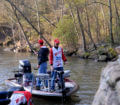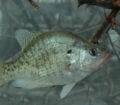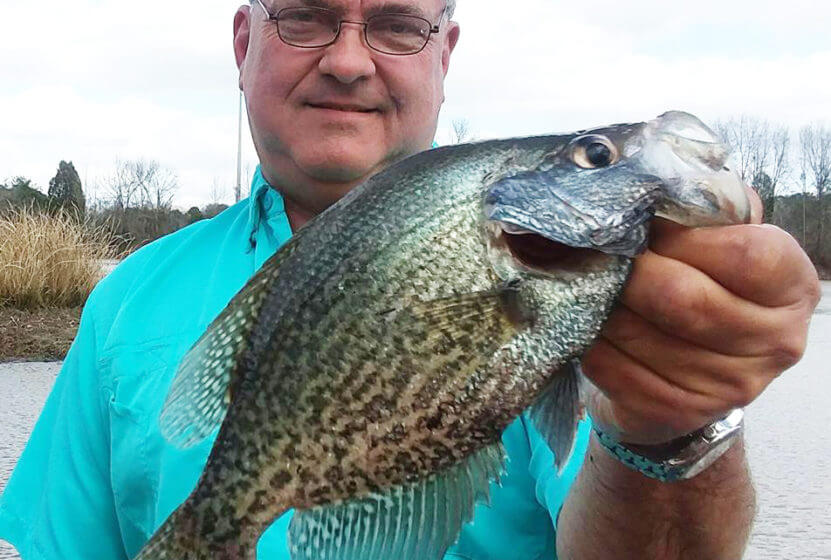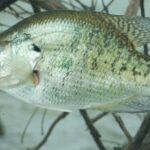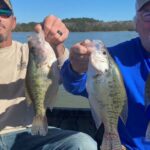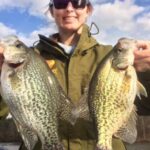 Editor’s Note: Are you tired of going fishing and not catching any crappie? Would you like to eliminate some of the guesswork from finding and taking crappie? Would you like to know the secret haunts and specialized techniques that will help you take speckled sides on every outing? Crappie-fishing guides and tournament crappie pros must find and take papermouths every day they’re on the water. They’ve unlocked many of the mysteries crappie have held beneath the surface for years, and this week we’re covering some of their most-productive tactics.
Editor’s Note: Are you tired of going fishing and not catching any crappie? Would you like to eliminate some of the guesswork from finding and taking crappie? Would you like to know the secret haunts and specialized techniques that will help you take speckled sides on every outing? Crappie-fishing guides and tournament crappie pros must find and take papermouths every day they’re on the water. They’ve unlocked many of the mysteries crappie have held beneath the surface for years, and this week we’re covering some of their most-productive tactics.
Roger Gant of Corinth, Mississippi, has his own guide business on Pickwick Lake on the Mississippi/Tennessee/Alabama borders and explains, “I believe one of the main secrets to catching more crappie is understanding water clarity and knowing how to find structure on the bottom. If I go to a new lake, I search for structure where crappie should be holding according to the water temperature and the time of the year. Not much structure is in the water at Pickwick Lake. Unless the water is stained, crappie may spawn as deep as 20 feet there. I’ve caught crappie from 26 – 30 feet deep in the spring and summer on Pickwick.
 “To get a small jig down that deep to catch spawning crappie, generally I troll a small-diameter 6-pound-test line on B ‘n M’s graphite crappie poles (www.bnmpoles.com). But if the water is dingy, I may fish with 8-pound test. In clear water, I’ll troll two, 1/8-ounce jigs tied about 16 inches apart over structure. If the water is very clear, I troll particularly slowly.
“To get a small jig down that deep to catch spawning crappie, generally I troll a small-diameter 6-pound-test line on B ‘n M’s graphite crappie poles (www.bnmpoles.com). But if the water is dingy, I may fish with 8-pound test. In clear water, I’ll troll two, 1/8-ounce jigs tied about 16 inches apart over structure. If the water is very clear, I troll particularly slowly.
“Also I’ll troll in the middle of a lake to catch crappie. When you’re fishing in water deeper than 20 feet, crappie don’t have to hold on ledges and drop-offs. I look for stump fields in that deep water, because usually crappie will be in those types of regions. I’ve found that crappie generally will associate with any kind of irregular bottom – whether it’s a stump field, a drop-off or a hump out in the middle of a lake. I believe large crappie prefer deep water. I catch crappie all year long in deep water.”
For more information on Roger Gant, call 662-665-5160; 731-689-5666; 662-293-0075.
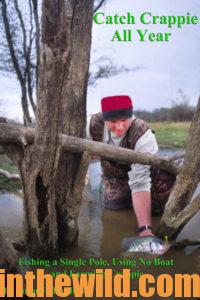 To learn more about crappie fishing, check out John E. Phillips’ book, “Catch Crappie All Year: Fishing a Single Pole, Using No Boat and Farming Crappie,” available in Kindle, print and Audible versions at https://www.amazon.com/Catch-Crappie-All-Year-Fishing-ebook/dp/B00VO0DZTI.
To learn more about crappie fishing, check out John E. Phillips’ book, “Catch Crappie All Year: Fishing a Single Pole, Using No Boat and Farming Crappie,” available in Kindle, print and Audible versions at https://www.amazon.com/Catch-Crappie-All-Year-Fishing-ebook/dp/B00VO0DZTI.

